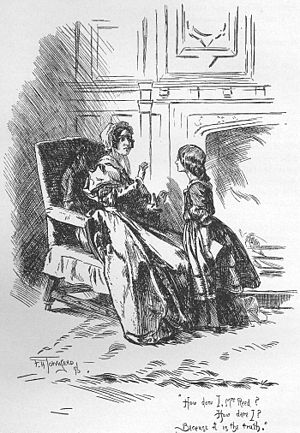| English: "How dare I, Mrs Reed? How dare I? Because it is the truth." (Photo credit: Wikipedia) |
My first moral principle is clear and firm: never do anything to purposely hurt anyone. Just like Jane Eyre, I learned kindness through my hardship: When I was bullied during my childhood, the pain I felt when I was savagely beaten, only "inspired" me to make resolution, that I would never exert the same kind of pain to any other persons. Yes, I learned that before I heard the name of Jesus Christ, or Buddha, or any other "Saint"'s voice. And I can proudly say that in my life I've never done anything purposely hurt anyone.
So does this mean that I never did anything hurt anyone? Unfortunately, that's not the case. But why and how? Because I've offended people simply by thinking differently, or, by stating what I thought. So, does this mean I should never speak anything that I know they would sound offensive to someone, because it's my first principle to not hurt anyone? My answer is again clear and firm: No. Why "no"? Because there is a difference between two kinds of offenses (of course I don't mean there are only two kinds).
The difference I found is, offenses done for the purpose of hurting others, should be considered as entirely immoral, but "offenses" done for the purpose of reasoning, finding truth of life (no absolute truth, of course), questioning existing conventions, etc., should be considered entirely moral and innocent. Further more, under the second situation, those who feel offended should ask themselves: why do I feel offended by just hearing difference voices?
Yes, humans are complicated. And just because we all offended each others once a while, more or less, doesn't mean we are equally guilty.

A good post.
ReplyDeleteI have been writing something similar recently, the Charlie Hebdo stuff got me going on it again recently.
Sometimes the offended is far more harmful to society and the offender.
So true, that the offended is far more harmful than the offender!
DeleteThanks for comment, PBScott!
Excellent post.
ReplyDeleteYou put into words thoughts that are latent in my mind.
Thanks Julia!
DeleteGreat post Yun Yi. Your stance must take real self-control at times. It is the bullied child who so often becomes a bully themselves in later life. It is restriction of information that is one of the greatest forms of institutionalised bullying. We can only progress as a race of people by being tolerant of each others divergent views, whilst holding fast to our own.
ReplyDelete"We can only progress as a race of people by being tolerant of each others divergent views, whilst holding fast to our own."
Delete--- Well put, Neil!
Offense is taken, not given. Whatever insults or recriminations someone flings at us, it's our choice to feel offended. We can also choose to ignore them or tell them to fuck off...or just laugh. Now physical aggression is another thing, we should never passively accept that.
ReplyDelete"Offense is taken, not given. "
Delete--- those are wise words, marty. I can't agree more!
Great post, Yun.
ReplyDeleteThanks Kris!
DeleteYun, sometimes people get offended even by your existence. Isn't ISIS all about that?
ReplyDeletethat's true, uma.
Delete